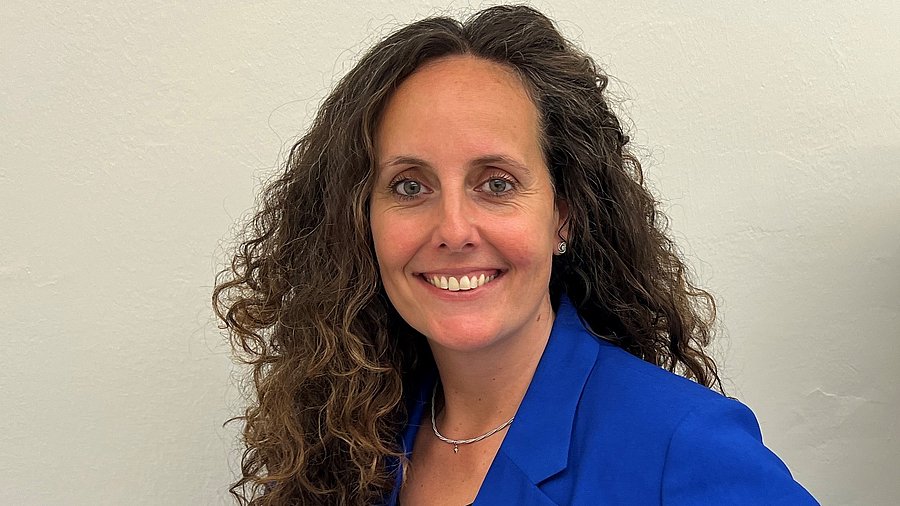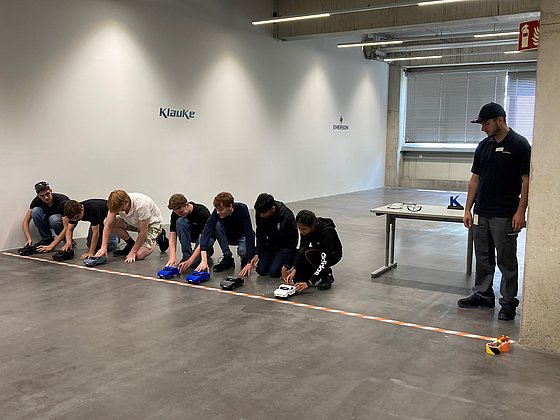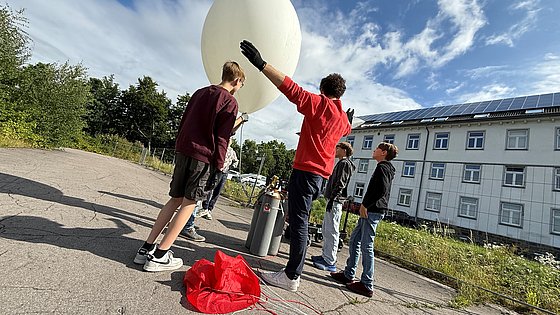
BeST - The Bergisch School Technology Centre
Sarah-Lena Debus / zdi centre BeST
Photo: zdi centre BeST
BeST - The Bergische Schul-Technikum
Sarah-Lena Debus, coordinator of the zdi centre BeST, on the new course programme for all pupils to promote the next generation of STEM talent in the Bergisch city-triangle
BeST, zdi and STEM - three acronyms that have a lot going for them, as they aim to awaken pupils' interest in careers and study programmes in sciences, technology, engineering and mathematics (STEM). Sarah-Lena Debus is the coordinator of the centre 'Zukunft durch Innovation. NRW', or zdi Centre for short, and is responsible for the Bergische Schul-Technikum (BeST), which will once again be offering a comprehensive, free programme of courses for pupils of all school types from year 7 onwards in October.
Foundation of the zdi centre in 2008
In the 2000s, many employers realised that there were far too few skilled workers in the STEM sector. In response to this need, the Wuppertal zdi Centre was founded in 2008 on the initiative of Jörg Bröscher, Director of Studies at the Alexander-Coppel-Gesamtschule in Solingen. “He was looking for people here at the university who would support the project,” Debus explains, “and that's how he met Prof Anton Kummert from the Department of Electrical Engineering at the Chair of General Electrical Engineering and Theoretical Communications Engineering. He was immediately enthusiastic about the project and immediately agreed to dock the project to his chair. That's how we were founded as the second zdi centre in NRW.” Only Bochum was a few months quicker. The zdi centre BeST is a project supported by the Federal Employment Agency (Regional Directorate of North Rhine-Westphalia), the Joint Initiative Future through Innovation (Ministry of Innovation, Science and Research of the State of North Rhine-Westphalia) and the University of Wuppertal. ”At the time, we were one of the initiators in NRW of the 47 zdi centres that now exist throughout the state. We in Wuppertal are still one of the largest zdi centres, also responsible for the neighbouring cities of Remscheid and Solingen.”
Differences to the Junior Uni Wuppertal
The zdi centre BeST is part of an NRW-wide education network with over 5,000 partnerships with stakeholders from the fields of science, schools, business, politics and society. There are now zdi centres in all districts and independent cities in NRW.
The regular courses offered by the Bergisches Schul-Technikum are aimed exclusively at pupils in higher grades who are interested in STEM subjects. ”We naturally work together with the Junior Uni and other local initiatives as part of the education chain, we also have cooperation courses, but our focus is basically from year 7 upwards, because our courses serve to provide in-depth career and study guidance.” All BeST courses are completely free of charge, Debus emphasises, because the aim is to reach all young people, regardless of where they come from. Another difference is the variable locations of the courses on offer: ”We don't offer our courses locally in one place, as the Junior Uni does, but offer our courses at 12 key locations in the city-triangle Wuppertal, Remscheid and Solingen on a regular basis. Here at the university, for example, the young people can also visit all of our laboratories and training workshops. City libraries, training centres, and vocational colleges are also part of the focus locations where courses are regularly offered. After each course, participants receive a certificate for their application documents and a positive entry on their school report. Furthermore, young people register for the courses themselves. In most cases, they find out about the courses on offer and the opportunity to attend a BeST course without obligation directly from BeST staff at their school. They then register with us because we aroused their interest in the lectures and they have already decided in favour of a particular topic. At this point, parents play more of an advisory role in the afternoon.

Electric cars were manufactured at Klauke
Photo: BeST
Apprentices and students become trainers
The course instructors are also close to the target group. ”We have different types of courses”, Debus explains. “Firstly, there are the courses here at the university, which are led by students from Bachelor's or Master's programmes, doctoral students and also permanent BeST employees who were hired specifically for this purpose. When we go to companies, the courses are run by the training managers or usually with apprentices who also often plan the course content for the BeST students themselves.” This way, the apprentices can also pass on the knowledge they have learnt and are not too far away from the pupils in terms of age and interests. Debus cites two examples: ”At Zwilling, for example, there was once an LED cube that the apprentices planned completely on their own. Or at the Klauke company in Remscheid, where they build an electric car, print the chassis of this car, build and solder the entire motor themselves and also programme it. They then race it afterwards.”
Unusual courses on offer ...
The is a wide range of courses offered, e.g., an unusual new format complements the overall programme. ”For example, the wallpaper company Erfurt will be taking part for the first time. They are still the market leader with their woodchip wallpaper and want to present their modern image to young people. They are offering a small group of students the opportunity to produce their own wallpaper, i.e., with their own print designs, which they can take home with them afterwards.” Another course is entitled 'Genetic fingerprinting - on the trail of the perpetrator'. BeST also uses one of the university's own student labs for this project. “The zdi student labs are something special,” the coordinator explains, ”because not all centres have access to labs. We have three [KR1] Bergisch Science Labs: BeLL Bio, Chemie-Labothek and Geo-IT. Unlike us, these school labs organise courses for entire school classes that any teacher can book at any time, including teachers from outside the Bergisch land. These course contents are usually thematically adapted to the core curricula of the schools and can be perfectly integrated into the lesson series.”
In October, a total of 25 courses will be offered at 12 locations. This is a unique, cross-city study and career orientation programme with a unique selling point in the Bergisch Land, emphasises Debus and continues: ”There are of course many initiatives and educational partners that do similar things and cooperate with us excellently, such as CHECK, the school research centre in Solingen. We support the STEM programme there with some of our courses. At the request of school groups, individual parents or teachers, we also offer special formats, such as school clubs, days of science for entire year groups, individual work placements or other special formats. We are very flexible and try to offer everyone a good and tailor-made programme.”
[KR1]Eigentlich sind das vier Science Labs:

A balloon is filled
Photo: BeST
... at different locations
Companies in the Bergisch cities of Remscheid, Wuppertal and Solingen are also involved in the BeST courses. This offers many advantages for the students. ”It's good for the companies because they can see the people directly, beyond the application. If there are six or eight students, then they can already see whether the young people fit into the company at all. However, they don't see the grades that are normally used as a basis for invitations and recruitment. This selection process means that someone can already impress the company during the course, even if they are not among the best at school. The students often already submit an application for a work placement.” For the students, in turn, it is simply great to get to know the company and find out what they can already do. The certificates that are handed out afterwards are also helpful for the upcoming application, as well as the positive entries on the respective school report.
The course programme is advertised at up to 68 partner schools
From the preparation of the programme to the realisation of the courses everything is organised by BeST, so the companies have no work to do, Debus explains. ”The entire registration system is handled by us. Furthermore, we check declarations of consent for photo rights and we do all the press work. The companies receive a finalised list of pupils at the beginning of the course and don't have to worry about anything else apart from the actual course schedule at the company. We provide safety shoes, if necessary, and organise lunch in the University’s dining hall when the young people are on campus.”
In Remscheid, Solingen and Wuppertal 68 partner schools are visited regularly. ”The first advertising phase is currently underway; it always begins at the start of the new school term. During this phase which takes four to six weeks, we go to the schools with our trolley cases, exhibits, and flyers presenting BeST either in short sessions from class to class or in the main assembly hall. We show a short video of the robot competition, for example, and try to convince the children to take part.” The Wuppertal zdi centre has had its own registration tool developed and made available to all other zdi centres. It contains all course descriptions and locations, you can take a look at the BeST photo gallery, and, of course, use it to register. ”Now is the right time to enrol” concludes Debus, ”registration is possible until the course is full. We also offer some courses several times at different locations in all three cities in order to shorten the distances, or if demand is particularly high.
You can find the full range of courses with the option to register at: https://zdi-best.de/kursuebersicht/. (in German available only)
Uwe Blass
Sarah-Lena Debus holds a diploma inbiology and heads the zdi centre BeST at the University of Wuppertal.
